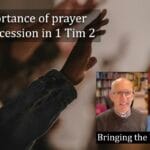The Sunday lectionary gospel reading for Trinity 14 in Year C is Luke 16.1–13, the so-called Parable of the Unjust Steward (or ‘Dishonest Manager’).
(The epistle is 1 Tim 2.1–7, and you can find video discussion of that reading here, and video discussion of Luke 16 here. Both are also posted at the foot of this article.)
For various reasons, the Unjust Steward is one of the most intriguing and challenging parables of Jesus to interpret, though popular readings commonly pass over the problems with it. Here, I will explore the text of the parable, highlight the issues, and also point to a quite alternative reading of it—you, dear reader, must decide whether you find it convincing!
As usual, we need to resist the temptation that the lectionary (in collusion with chapter divisions) sets before us—to chop the text up and read each of these passages in Luke in isolation from one another. Many ETs begin this with a simple ‘Jesus said to his disciples…’, failing to translate the double conjunction in Greek δὲ καὶ which makes a strong connection with what has preceded: ‘Jesus also said to his disciples…’ It reminds us that the preceding triplet of parables of the lost, the shorter two followed by the lengthy parable of the prodigal father, were in the first instance directed to and spoken against the grumbling Pharisees, an answer to the objection that Jesus is spending too much time with undesirables.
(We should note here that the movement described in Luke 15.1–2 is centripetal; the undesirables are attracted to Jesus, and he receives them. Luke has earlier clarified, in slight contrast to Mark and Matthew, the purpose of this reception: that they should repent and change; sinners are ‘sick’ and need a spiritual doctor, who will heal them if they will repent, Luke 5.31–32.)
Thus the parables of the lost demonstrate that God continues to seek out the undesirables and welcomes them back, in contradiction of the Pharisees’ static preservation of the holiness of the people of God. Yet now, Jesus turns to the disciples to offer another insight—though it is one that, as is characteristic of Luke’s account of Jesus, is overheard by the Pharisees even though it is only obliquely relevant to them.
And we need to note the clear connections between the parables as well as the wider teaching of Jesus in Luke. In the beatitudes in Luke 6, the blessing of the poor is paralleled with woe to the rich (Luke 6.24). The rich fool builds bigger barns only to die that night (Luke 12.16–20); the rich man in the next parables ignores the needs of beggar Lazarus; rich Zacchaeus responds to Jesus with repentance and generosity (Luke 19.2); and the rich contrast with the widow and her mite (Luke 21.1)—all unique to Luke. And the steward here has squandered (διασκορπίζω) his master’s wealth just as the younger son squandered his inheritance.
The parable itself is a masterpiece of compressed storytelling, focussing on the key ideas, and drawing us into the story by suspense and surprise.
The social situation would have been familiar to Jesus’ listeners; any wealthy person would likely employ an oikonomos (from which we derived our term ‘economy’), someone to manage his household, in particular his business and financial interests. Intriguingly, we are not told that the steward has squandered his master’s possessions, only that he was accused of doing so. The master gives him no chance to defend himself; he summarily dismisses him with a ‘You’re fired!’ One of the many ironies of the story, and a root of our difficulties with it, is that the steward then fulfils in his actions just what he was accused of—so perhaps we have the evidence for the accusation after all!
The steward engages in a soliloquy, and, as we have previously noted, such inner conversations, by an individual or amongst a group, are consistently portrayed negatively by Luke. Perhaps the other most telling example is in Luke 18.11, where the Pharisee ‘stands and prays to himself’. As with other soliloquies, here the man is concerned solely with his own selfish interests and instinct for self-preservation. He rejects the possibility of honest manual labour (perhaps he has spent too long in a sedentary occupation?) and, having had some social standing through his association with wealth, is not prepared for the only other real option—to depend on the charity of others.
He therefore makes a decision—but, again, we are not told what it is. We therefore have to listen as the story unfolds in order to understand his action and therefore his thinking. At first it might sound as though ‘receive me into their houses’ suggests the hope that people might give him accommodation. But we need to remember that he has been an oikonomos, and he is hoping that he will be received into their oikoi—in other words, he is looking for a similar role in managing the affairs of those who have been business partners with his master. The quantities involved (‘nine hundred gallons of olive oil’, ‘thirty tons of wheat’ TNIV) make it clear these are no mere domestic clients, but serious and substantial business partners.
We also ought to note how this fits well in the culture, where rather than having fixed prices as we are used to, the culture is one where bartering and trade-offs were accepted as part of doing business. In context, debts would be recorded by means of a promissory note written by the debtor, not a bill from the creditor, so the steward is doing the natural thing by asking his master’s clients to re-write the debt.
Would those who debts were reduced think this was a good thing? Would they not realised that the steward was now squandering the master’s resources, so he would be a liability as an employee? There is no hint of this; unlike us as readers, the actors here do not know the full story, and there is no hint they are aware of the steward’s dishonesty. Since the steward would have the full authority of the master in his actions, they would see this as a welcome act of generosity.
Again, at the end of the parable, all the unnecessary details are stripped away. We are not told how the master discovers what has happened, or his complete reaction. We should note, though, that the master does not commend the steward for his dishonesty, but for his ‘shrewdness’. Despite the entirely negative portrayal of the steward and his situation up till now, the climax of the parable ends with this highly positive term. φρόνιμος and its close relation φρόνησις are usually translated prudence, understanding, or wisdom; they refer to the practical wisdom of recognising a situation, and then taking the approach action—’the faculty of thoughtful planning’ (BDAG). Jesus uses precisely this term—in connection with being a good steward—in Luke 12.42, where he is teaching on the need to be alert and ready for his (future) unexpected return. It is the term he uses for the ‘wise’ maidens, who keep their lamps full of oil, waiting for the bridegroom to come (Matt 25.2).
It is therefore striking when, in the summary apothegm which sets out the lesson to be drawn from this parable, Jesus uses eschatological language contrasting the ‘sons [children] of this world’ with the ‘sons [children] of the light’. We would normally expect the former to be characterised negatively, and the latter positively, but here Jesus does the opposite: the practical wisdom that he urges on his followers is more often found in those who do not seek honesty and integrity than in those who have been redeemed!
And he goes further, even suggesting that the steward’s dishonest actions might be a model for ours! Jesus is quite clear: mammon, the Aramaic term for wealth which views it as a spiritual force, not a mere object, is indeed ‘unrighteous’—’filthy lucre’ we might call it. And yet, somehow or other, we can gain eternal friends from our use of it.
The final cluster of sayings, not strictly part of the parable, offer us something of a key to making sense of its puzzling lesson.
The first three together form a fourfold parallelism, with the first saying contributing two elements of contrast, and the others following:
| Luke 16.10a | faithful in very little | faithful in much |
| Luke 16.10b | dishonest in very little | dishonest in much |
| Luke 16.11 | faithful with unrighteous mammon | entrust you with true riches |
| Luke 16.12 | faithful in handling what is another’s | give you that which is your own |
By means of this parallelism, Jesus is making some radical claims. Firstly, he is claiming that wealth, money, and possessions are as nothing compared with the riches of the kingdom of God; the term here signifies something of no significance at all. This is entirely in line with his other teaching all through the gospels, which uses just this kind of comparative language, for example in the parable of the treasure in the field in Matt 13, and the parable of the ‘talents’ where servants have been entrusted with their master’s wealth, as stewards, whilst the master is away. Secondly, he is asserting that, whatever wealth we have, it is not our own; we are merely stewards, entrusted with these things, that actually belong to God, and are in our management for a short period of time. ‘The earth is the Lord’s, and everything in it’ (Ps 24.1).
In this sense, wealth is nothing important, and should simply be managed. But the final saying, added by Jesus, or included by Luke, with its parallel in Matthew’s collection of Jesus’ teaching in the ‘Sermon on the Mount’ in Matt 6.24, offers a contrasting and complementary perspective: wealth is always at the same time a potential rival god, and we must ensure that it serves us, and not that we serve it. The only solution to this is to see it in its rightful place.
(We might note that Paul takes just the same paradoxical view of food offered to idols in 1 Corinthians: on the one hand, idols are nothing because Jesus is Lord, so it doesn’t matter; on the other hand, idols are rival gods so we play fast and loose at our spiritual peril.)
Three years ago, I published an alternative reading of this parable offered by my friend Andrew Talbert. He sums up the puzzles of the parable well:
Commentators and pastors alike squirm through this parable with virtually the same conclusion: Jesus teaches that there are select occasions in which one can be dishonest with money. Not only does this interpretation chafe readers of the gospels, but it also seems completely out of step with the financial concerns that dominate the Gospel of Luke. Nevertheless, we see throughout modern commentators variations on this theme. Joel Green views this passage as continuing the theme of hospitality from chapter fifteen by focusing on almsgiving and friendship. Situating this in the language of patron-client relationships, Jesus offers this parable as challenge to his disciples to use mammon to make friends without expectations of reciprocity, so that there might be true social solidarity between the rich and the poor, thereby breaking down the patron-client relationship and meeting one another as “friends” (Joel Green, The Gospel of Luke, 486–89).
Though not couched in the same language of patronage, Bovon concludes similarly to Green “the Lukan Christ invites his readers to make friends for themselves with their material wealth and promises them in return spiritual benefits in the world to come” (Francois Bovon, Luke 2: A Commentary on the Gospel of Luke 9:51-19:27, 450). Yet he goes further than Green in pointing out the perennial difficulties raised by this passage and that “Christian tradition has preserved this parable in spite of the fact that it was a source of embarrassment,” (Bovon, 453) because of Jesus’ seeming departure from his other teachings about wealth.
Continuing in this trajectory, John Carroll foregrounds the enigmatic and elusive nature of the parable and repeatedly admits “readers can only build coherence by filling gaps in the assumed cultural script” (John Carroll, Luke: A Commentary, 325). He rightly notes that 16:8–13 are needed to guide the reader’s response to the parable, and then suggests a trajectory forward with the passage: Christians must somehow translate the story of the unjust steward into “the values of God’s reign” (Carroll, 327), and that this entails making friends with people who can help secure one’s future “through use of material resources… in ways that are entangled with the ‘unrighteousness’… of money and property” (Carroll, 327).
A final example from modern commentators suggests that internal clues in the text suggest the manager is falsely accused, and therefore the condemnatory remarks apply primarily to the master, not the manager. Therefore, the reader can readily identify with Jesus’ statements about making friends with mammon, because the manager has not done anything wrong from the beginning (Mikeal Parsons, Luke, 244–48).
Each of these interpretations fails, however, to deal adequately with several glaring difficulties: using mammon to make friends, though that makes one an opponent of God (16:13); the identification of the steward as “unjust” or “unrighteous” and a “son of darkness” (16:8); that the master commends the steward for essentially robbing him further (16:8); the connections over “squandering” money to be drawn between the prodigal son, Lazarus and the rich man, and this passage; the analogy that believers are to draw between the unjust steward and themselves based on Jesus’ teaching elsewhere regarding wealth; and the fact that the “friends” do not have “eternal homes” (16:9) into which they can welcome others.
He then goes on to follow Stanley Porter’s argument that the parable should be read as irony. The lesson that the steward offers us is in fact not true, as the rich man in the next parable discovers painfully for himself.
Though I found this intriguing, I was not in the end persuaded, for three main reasons. First, there appears to be no indication in the text that this is what either Luke or Jesus think. Secondly, I do think that the following sayings offer a key to reading the parable, and these are not considered in Andrew’s reading. Mammon is indeed a rival god when we do not realise that it is entrusted to us for a time and truly belongs to God; but when we realise that, it can be put to good use.
Thirdly, I have to say that Jesus’ saying ‘For the people of this world are more shrewd in dealing with their own kind than are the people of the light’ (TNIV) rings true to my experience! I have frequently observed that, out of a sincere desire to do the right thing, all too often Christians (including myself) have been naive and over-earnest, and could have learned a lesson from those in the non-Christian world who often have a much better grasp of the practical wisdom (φρόνιμος) that is needed to get things done. The Alpha Course has often been criticised for using ‘unrighteous’ marketing, branding and promotional methods—yet it has indeed been a method of bringing many into ‘eternal homes’.
I do think, however, that Andrew puts his finger on something vital in reading this parable—Jesus’ humour.
As serious readers of scripture, we can read so “seriously” that we often miss out on humor, irony, sarcasm, and other literary devices we regard as “not serious.” By way of example, I would look to G. K. Chesterton, who rejected the accusation that he was not serious because he attempted to be funny so frequently. Chesterton reminds us, “Funny is the opposite of not funny, and of nothing else.” Readers of Jonah often miss the fact the Nineveh, where Jonah refuses to go, means something like “house of fish,” and Jonah is forced to go into a “house of fish”; Paul’s discussion of love in 1 Cor 13 is a condemnation of the Corinthian church, and follows something of a sarcastic rebuke of the “spiritual” in that community; despite all the lights being lit and the upper room being so bright, Eutyches still fell asleep (and out the window!) during Paul’s preaching. The point of this is simply that we need to be aware and make use of all of the interpretive tools at our disposal to be good readers of scripture.
The parable is actually very funny. The steward is accused of wasting the master’s resources; fine, he thinks, I really will waste them, but for my own gain! He is supposed to be a wise steward, to the benefit of his master—but once his master has sacked him, he will be wise for himself! I wonder if, at the end, the master actually laughed, realising with humour that the steward had outmanoeuvred him.
And, Jesus tells us, if the people of this world are able to use all their resources and cunning for such a small and temporary goal as their own selfish interest in this passing world, how much more should we be ready to use all our resources and cunning, all our insight and practical wisdom, for the purposes of the eternal goals of the kingdom of God? There is honour among thieves, and wisdom among unrighteous stewards. If even this unrighteous steward can be wise and cunning, how much more should we be?
The picture at the top is ‘The parable of the unjust steward’ (1540) by Marinus van Reymerswaele, kept in the Kunsthistorisches Museum in Vienna.
Come and join Ian and James as they discuss both Luke 16, and the epistle 1 Tim 2.1–7:

 Buy me a Coffee
Buy me a Coffee




























Ive rarely found much humour in what Jesus says, and I suspect Im like many others. But a few years ago I watched the animated ‘The Miracle Maker’ and when Jesus told his parable about planks in eyes, I laughed out loud. Perhaps that’s what we need, more animation!
Great that you have exercised humorneutic tools to interpret this chunk of Luke!
Oh very good!
The irony is that the Master ends up being seen as generous and kind in the community as a whole, so the shrewd steward makes the Master look good even as he is stealing from him.
This may be the reason that he is commended by the Master at the end – as the Master can’t really unwind the new contracts without a huge fuss, and can only bask in the new found “generous” reputation – which may not have existed before.
Perhaps the solution is simpler. The parables of Jesus are about the kingdom – which means they are first about Israel. Tax collectors and sinners seem obviously ‘lost’ – and the three parables of lostness are told in response to the judgementalism of scribes and Pharisees.
But salvation is not just for those who look as if they need it – it is also for those who can’t see their need. It is not just for the poor – it is also for the rich. The Unjust Steward is told to expose the need of those who see themselves as the spiritual leaders of Israel – like the scribes and Pharisees. Their Lord is about to hold them to account – indeed is now doing so.
So the wise thing to do is to acknowledge their time is up and to make friends with those who look as if they are in need – debtors, those who need their debts forgiven i.e. the very folk who already know their need and see Jesus as the answer they are looking for.
That requires a big change of attitude – the attitude already depicted in the older brother in the Parable of the Prodigal.
I was taken with your writing about the steward’s “soliloquy.” Last Sunday I read back in the third parable – the Prodigal Son/Father. There when he “comes to himself,” he then says in his own soliloquy, “I will arise ….. ” For me, noticing that you draw attention to the “and also” connection to what has preceded this passage, we are dealing with contrasts in behavior. The son repents and there is joy in Heaven and with the Father. the steward is admired for his cunning but while he may find himself to some advantage, that begs his relationship with God. What are the eternal homes that his friends can provide? Is he not eventually as foolish as the man with the barns and super harvest. So – I think I have my point for this Sunday. Especially, living in an era where dishonesty and lies, hate and retribution are the ways of our leaders.
Thanks for this helpful exploration of this challenging passage. Kenneth Bailey is, as always, brilliant on this parable in both Poet and Peasant, and Jesus Through Middle Eastern Eyes. He really brings out the cultural gap between the world of Jesus and ours today and helps us to be cautious about being sure we know what was in Jesus’ mind.